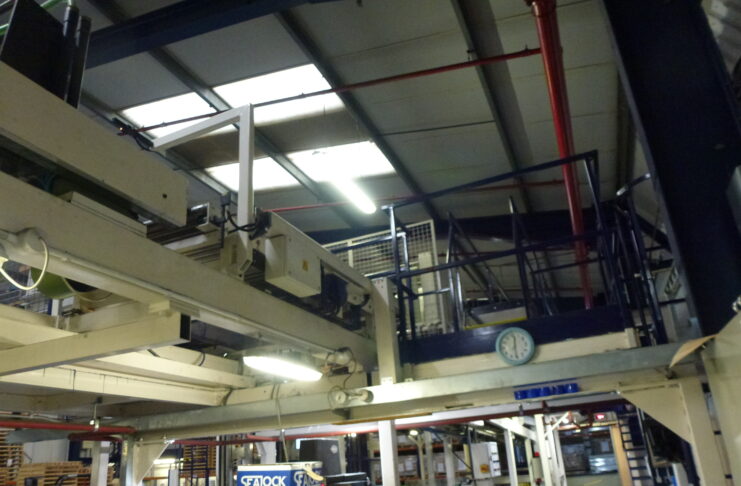A manufacturing firm in North Yorkshire has been handed a fine exceeding half a million pounds after a night-shift worker fell from a height while trying to clear a blockage on a production line.
Mark Pinder, 51, died at East Riding Sacks Ltd’s Stamford Bridge facility, near York, on 11 February 2023. The experienced operator was working alone on the night shift when he attempted to remove a blockage on the upper deck of a sack-making machine.
Standing on stationary metal rollers, he was struck when a part of the machinery unexpectedly activated. He lost his balance and fell around three metres to the concrete factory floor. Despite the efforts of paramedics, Mr Pinder was pronounced dead at the scene.
The Health and Safety Executive (HSE) found serious safety failings by the company, including the absence of a safe system of work, a lack of adequate staff training and a failure to assess and mitigate the risks of working at height.
Routine Shortcuts and Unseen Hazards
Mr Pinder’s death shone a light on widespread unsafe practices within East Riding Sacks Ltd, which manufactures paper sacks for industrial use. According to HSE investigators, staff had developed informal workarounds that bypassed safety procedures.
Employees were found to be routinely clearing blockages on machines without following proper isolation procedures. The investigation revealed that workers relied solely on interlocking guards to prevent machinery movement during maintenance tasks, despite not being trained in how to fully isolate machines from power sources.
And, the HSE probe found, staff often used conveyor belts as shortcuts to move between gantries on the factory floor. Instead of using stairs and designated walkways, they were climbing over handrails onto equipment. These unsafe behaviours had become normalised, with managers reportedly unaware they were taking place.
The investigation found that these practices were not being adequately supervised or risk-assessed, leaving employees exposed to serious injury or death.
Failings in Supervision and System Design
East Riding Sacks Ltd, based on Full Sutton Industrial Estate near York, pleaded guilty to breaching Section 2(1) of the Health and Safety at Work etc. Act 1974. The company was fined £533,000 and ordered to pay £6,066 in legal costs at Hull Magistrates Court on 30 April 2025.
The court heard that the company had failed to:
- Provide a safe system of work for removing blockages;
- Train employees in machinery isolation procedures;
- Recognise or mitigate the risks of falls from height;
- Prevent access to dangerous parts of machinery;
- Supervise or monitor staff to ensure compliance with safe working practices.
HSE guidance states that employers must take effective measures to prevent access to dangerous parts of machinery and avoid working at height unless absolutely necessary. Where work at height cannot be eliminated, suitable edge protection and fall prevention measures should be in place.
Tragedy Could Have Been Prevented, Says HSE
Speaking after the hearing, HSE inspector Elliot Archer said staff continued to die around the UK when working from heights. “Every year, a significant proportion of accidents, many of them serious and often fatal, occur as a result of people accessing dangerous parts of machinery and working at height,” he said.
Archer said when “access beyond machinery guarding and safety devices is required for the removal of blockages, robust isolation procedures to remove all sources of power should be implemented, alongside a suitable safe system of work”.
He added that if those measures had been in place at East Riding Sacks Ltd, the tragic accident would not have happened.
The prosecution was led by HSE enforcement lawyer Karen Park and paralegal officer Lucy Gallagher.
Lessons for Employers: Managing Routine Risk
The case demonstrates the importance of employer vigilance around everyday risks, particularly in environments where staff carry out repetitive tasks or lone working is common. Observers note that informal practices and workarounds can quickly become part of a company’s culture if safety isn’t consistently reinforced from the top down.
Experts in health and safety management advise employers to:
- Conduct regular risk assessments, especially for routine interventions such as clearing blockages;
- Ensure all machinery is fully isolated before maintenance work begins;
- Design work environments to remove or guard open edges;
- Provide clear, up-to-date training for all workers, particularly those on night shifts or operating complex equipment;
- Supervise work practices and investigate unsafe shortcuts before they become embedded.
Workers in Many Sectors at Risk
For workplace wellbeing professionals, the incident is a sobering reminder that preventable deaths continue to occur when safety systems are lacking or overlooked. While Mr Pinder’s case involves manufacturing, the underlying issues — rushed processes, undertraining, poor oversight and unrecognised risk — can be found across many sectors.
Falls from height remain the leading cause of fatal workplace accidents in the UK. According to HSE data, 40 workers lost their lives due to falls from height in 2022/23. The regulator’s full guidance on working at height and machinery safety, including the Provision and Use of Work Equipment Regulations, is available online.


